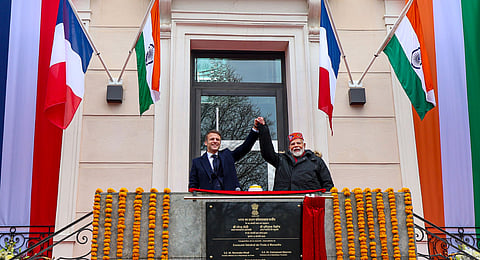

NEW DELHI: India and France on Wednesday decided to strengthen their strategic partnership as Prime Minister Narendra Modi sat down with French President Emmanuel Macron to firm up plans to bolster cooperation in nuclear energy and artificial intelligence (AI).
Both countries will join hands to develop small modular reactors (SMRs) as well as advanced modular reactors (AMRs). New Delhi and Paris will also work together to develop safe, secure and trustworthy AI. France has already announced plans to invest 110 billion euros in AI.
Modi and Macron agreed to enhance cooperation in the Indo-Pacific region with a joint declaration of intent for ‘triangular development’ to support the economic growth of countries in the region.
The two leaders also visited Marseille—the second-most populous French city after Paris—where Macron hosted a private dinner for Modi. There they jointly inaugurated India’s Consulate General and toured the International Thermonuclear Experimental Reactor (ITER) facility.
“The area of SMRs and AMRs has come up in more recent times, but has progressed quite quickly and the reason that you see a letter of intent is because both countries feel that there are real possibilities in taking this forward in the very near future,” Foreign Secretary Vikram Misri told reporters during a briefing in Marseille.
Misri said the demand for SMRs and AMRs has been identified as crucial, as AI will require vast amounts of electricity. “The amount of electricity that will be needed, if it is going to be sustainable, then it has to be something like nuclear power-driven electricity. That is the area in which SMRs and AMRs can play a key role,” the foreign secretary added.
As for the trilateral cooperation, India and France will look to deliver projects in third countries “by seeing how we can leverage our respective strengths and our capabilities, whether it is in terms of financial support or technical collaboration or capacity-building collaboration,” Misri said.
The bilateral roadmap on AI envisions that the norms reflect democratic values and promote human development.